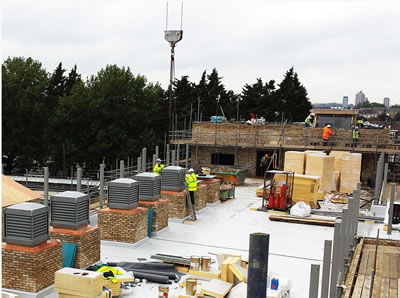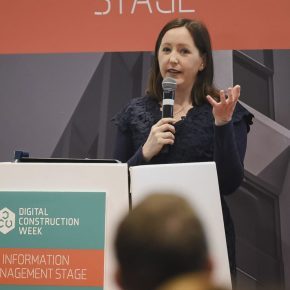
Directly employed labour is good for business
Site based installation work can prove to be a difficult element to get right and we have had many years of experience on what works and what doesn’t on sites.
Over the past three or four years we have noticed a change in attitude within the industry with installation contracts becoming more demanding and there being less goodwill. We are also aware of more main contractors splitting projects into packages and asking suppliers to own’ their installation projects from start to finish, and provide everything that is needed. Whilst a traditional business approach may meet with problems, this approach is working to Monodraught’s advantage because all our installation teams are staffed by permanently employed installers, many of whom have been with us for ten years or more.
But our service doesn’t end there. The teams are supported with a formal documentation process for each project covering every aspect of the contract, whether they are working with the client, architect or main contractor. We have an office-based contacts team, who control all projects from start to finish, liaising with our on-site contact teams throughout the project and providing them with all relevant information, working drawings, etc. To avoid problems arising with other contractors, Monodraught’s own site survey teams ensure that everyone knows exactly what is happening at all times throughout the contract, and what everyone is doing.
Once an order is placed, a client or the main contractor will have one person, acting as a single point of contact assigned to them, they follow through all design and installation processes on the project and this engineer is ultimately responsible for the final sign off on project completion. The information we produce is project specific detailing what is happening and when, and who needs to do what. We have developed this structure over many years, itemising each step and each process that needs to be done and when all based on the agreed Monodraught and customer contract, the project data and the installation drawings produced. Everyone is aware of what is required, including and especially, the Monodraught office based team. And all this is planned and available before we even get to site!
Monodraught installers undergo regular training to ensure they know how to use the systems upon arrival on site
No delays to projects
When we are ready to go to site, we run a provisional installation in advance, with a Monodraught team checking everything associated with the contract. We ensure with the main contractor that our installation team and equipment deliveries can access the site with no hold-ups or delays; and that everyone involved is singing from the same song sheet. Arrival dates are confirmed so that expensive tools, equipment and people arriving on site are able to start the job immediately. Anything less, usually involves extra costs and extra site visits for everyone involved.
Our provisional site visit usually a week before we are due to start work ensures a smooth running project because access blockages will have been removed, scaffolding is erected for roof access, and provision is made for the storage of equipment close to the workplace. Our teams can then be as efficient as possible and we get can complete the contract on time.
To maintain the performance of our installation teams Monodraught installers attend regular training courses and product updates to ensure that when they arrive on site they know our systems and can provide feedback on how they perform, enabling us to continuously develop our products.
We also hold monthly team meetings to review all our products and discuss ways to improve them, so our installers are constantly in touch with product development and often provide new ideas. For example, installation teams made a positive contribution to the development of our new Cool-phase system and we have taken on board many of their ideas and suggestions. Their feedback was absolutely fundamental and many significant changes are a direct result of input from the teams to make it easier to install. Their input actually contributed to the specification of the faster and highly efficient Gripple’ installation system, making Cool-phase save customers money!
Installers are trained beyond requirements
Employing our own teams gives Monodraught stability and much greater control, and it means our installers are qualified above and beyond the requirements of their job. Our contract office produces risk assessments and method statements for our products and projects, but on site the conditions may change. So the knowledge and experience of our teams is something we take seriously. We invest heavily in health and safety training and certification to ensure that teams are competent, capable and trained to carry out the job safely, no matter what conditions they encounter on site. They are trained to make judgements on site, allowing them to amend documentation and arrange for changes to be signed off in agreement with site agents. And we can only do that because we have your own experienced people working on site.
Commissioning is also managed by the installation teams, supported by the technical team in the High Wycombe office. A number of Monodraught installers are qualified to commission on site and we employ specific commissioning engineers with technical knowledge of our electronics and controls. When a project is completed and due to be handed over to the client our commissioning engineer is on site to approve our system and arrange a demonstration with the architect or main contractor to explain how our systems operate.
Considering the current state of the construction industry we believe that having Monodraught responsible for completing the whole contract, using its own highly trained installation teams, is a real advantage for specifiers, contractors and clients.
Monodraught,
Halifax House,
Cressex Business Park,
High Wycombe,
Buckinghamshire,
United Kingdom,
HP12 3SE
Phone: 01494 897700
Fax: 01494 532465
Visit Supplier's page
Latest news

8th April 2025
First look at industry speakers for GEO Business 2025
GEO Business, the UK’s premier geospatial event, is set to return to ExCeL London on 4 – 5 June 2025, bringing together the brightest minds in the industry.
Posted in Articles, Building Industry Events, Building Industry News, Building Products & Structures, Building Services, Exhibitions and Conferences, Information Technology, Innovations & New Products, Restoration & Refurbishment, Retrofit & Renovation, Seminars
8th April 2025
Digital Construction Week 2025 announces first wave of industry-leading speakers
Digital Construction Week (DCW), the UK’s premier event for digital innovation in the built environment, is set to return to ExCeL London on 4 – 5 June 2025.
Posted in Articles, BIM, Infrastructure & CAD Software, Building Industry Events, Building Industry News, Building Products & Structures, Building Services, Building Systems, Civil Engineering, Exhibitions and Conferences, Hard Landscaping & Walkways, Health & Safety, Information Technology, Innovations & New Products, Landscaping, Retrofit & Renovation, Seminars
7th April 2025
Abloy UK provides bespoke access control solution for CPA Group’s Lanarkshire HQ
Abloy UK has supplied CPA Group with its PROTEC2 CLIQ solution to streamline access control and protect assets at its headquarters in Shotts, Lanarkshire.
Posted in Access Control & Door Entry Systems, Architectural Ironmongery, Articles, Building Industry News, Building Products & Structures, Building Services, Case Studies, Doors, Facility Management & Building Services, Health & Safety, Restoration & Refurbishment, Retrofit & Renovation, Security and Fire Protection
7th April 2025
ASSA ABLOY EMEIA: A new generation of reader is added to the Aperio digital access family
There is now a way to control access digitally, effectively and wire-free, thanks to ASSA ABLOY EMEIA…
Posted in Access Control & Door Entry Systems, Architectural Ironmongery, Articles, Building Industry News, Building Products & Structures, Building Services, Doors, Facility Management & Building Services, Health & Safety, Information Technology, Innovations & New Products, Posts, Retrofit & Renovation, Security and Fire Protection
 Sign up:
Sign up: